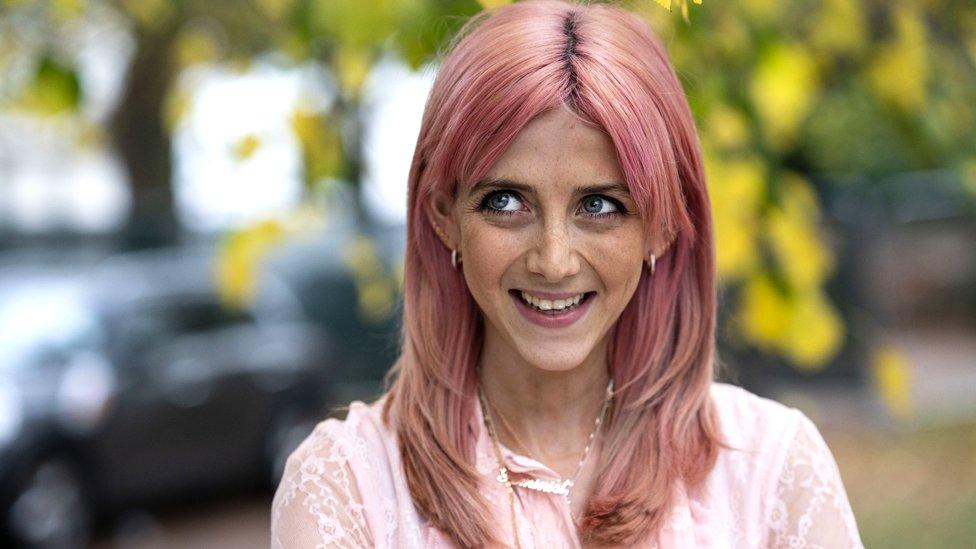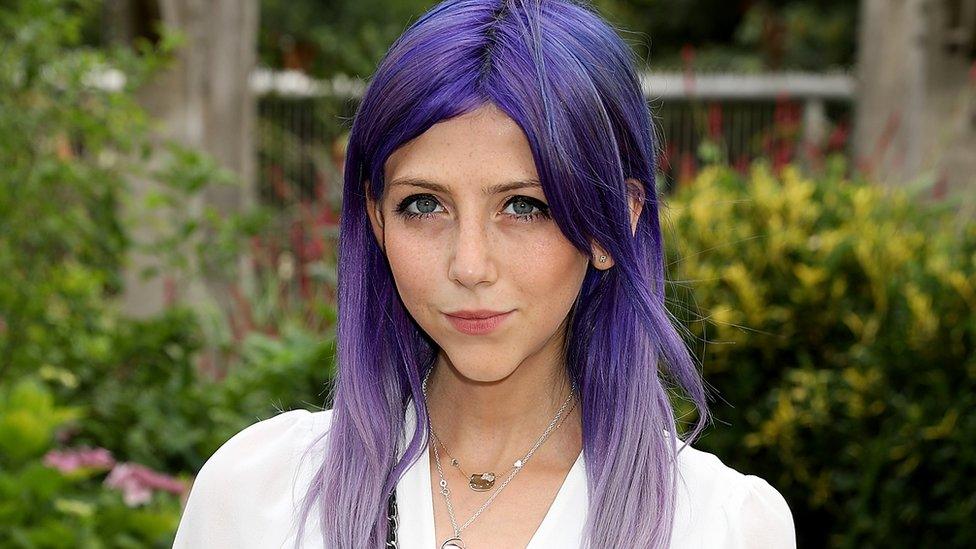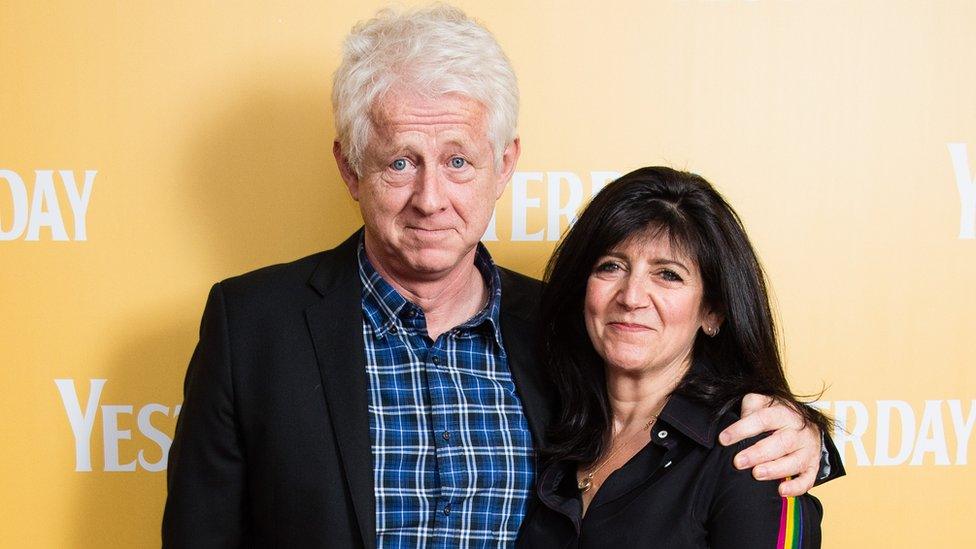Scarlett Curtis: 'I'd shut myself off from everyone'
- Published
Scarlett Curtis reveals celebrities' mental health tips
The promotional campaign for Scarlett Curtis's last book didn't quite go according to plan.
The launch of the writer and activist's 2018 collection of essays, Feminists Don't Wear Pink (and Other Lies), saw a pop-up display assembled in Topshop's flagship store in London's Oxford Street.
But, just 20 minutes after it had opened, it was dismantled. Sir Philip Green, the chairman of the chain's parent company Arcadia personally ordered the removal of the exhibition when he saw it.
"That was just such a big reminder that I do live in a very nice feminist bubble," Curtis tells BBC News, "where people talk about their mental health all the time, and it's really great, and I don't mind living there, but it was a good reminder that these things are still quite controversial."
Curtis later received an apology from Topshop, external and the company donated £25,000 to the UN charity Girl Up.
A year on, Curtis is back with a new book - It's Not OK to Feel Blue (and Other Lies). It tackles the subject of mental health conditions - particularly anxiety and depression, which Curtis has experienced herself.
Fearne Cotton, Emma Thompson, Davina McCall, Naomi Campbell and many other high-profile figures have each contributed a short chapter, essay or poem to the book.

Lena Dunham, Simon Amstell and Reggie Yates have all contributed to the book
But the 24-year-old makes a clear distinction between mental illness itself, and the shame surrounding it. She argues the latter is a significant problem which could be easily avoided with better understanding in society.
"By the time I was 19 I'd shut myself off from everyone in my life," she explains. "I felt so ashamed of what I was going through.
"I'd barely talked to my family about it, I had no friends, I was out of school, I was completely socially isolated. And while a lot of that was the mental illness itself, most of that was the shame. I felt like the only depictions I'd seen of mental illness before were people who'd had it define their lives, and that was who they were and they were in hospital forever and could never work, so I felt like that was me immediately.
"And I think the second I started talking about this, I suddenly started getting all these messages from people saying 'I'm going through this too'... to me that's what this book is doing.
Some of the contributors in the book offer practical advice for keeping the mind healthy.
Emma Thompson's tips include taking a cold shower for the uplifting effect it gives the body, as well as avoiding staying up all night watching Netflix documentaries about serial killers. Davina McCall's advice includes being willing to let people see your emotional vulnerability, while equally not being afraid to cut out toxic people from your life.

Miranda Hart writes about how she started to realise she was an introvert and how it contributed to her anxiety and chronic fatigue. "Some introverts are loud at times and love to perform (hello!) and we aren't always shy," she writes.
"But there are so many things about being an introvert that are HUGE light-bulb moments of 'Oh, THAT's why I hate big groups of people and must only socialise in small, quieter ways.' 'Oh, THAT's why I need to be alone so much to regain my energy.' 'Oh, THAT's why I hate open-plan offices.'"
However, critics argue that the more young people are aware of conditions such as anxiety and depression, the more they are likely to assume they have them - when in fact they may be experiencing the normalities of being young and insecure.
"Frequently the public is told that youngsters are suffering from an epidemic of panic, depression and suicidal thoughts," wrote Charlotte Gill in The Spectator., external "We live in a correctional culture which leads us to believe that anything uncomfortable must automatically be wrong and seen to by a doctor."
"There are lots of people that do suffer from mental illness and they must be taken seriously and they must get treatment and speak to friends, family and where necessary speak to medical experts," said Piers Morgan on Good Morning Britain., external
"But it seems to me a lot of people in this modern era now are being led into the thought process that every part of life's travails - the normal rough and tumble of life - now has to be categorised as mental illness, and I don't think that is helpful either."

Curtis says the "shame" surrounding mental health could be easily avoided
Curtis argues that this strand of opinion only strengthens her case that better understanding of mental health is needed.
"From a scientific point of view, we are so early in this journey," she says, pointing out that anxiety was only recognised as diagnosable disorder in 1980. "When we look at stats on anxiety and say people are more anxious than before, we don't know that - it's just that people are talking about it more. Actually, when you look through any piece of literature or art or film, you can see that these issues have been going on forever.
"The other thing is, if you've ever had a panic attack on the train, or you've never been able to get out of bed because you're so depressed, the idea that you'd choose that is so ridiculous - just getting the courage to talk about these issues is the hardest thing."
In the book, Davina McCall acknowledges it can be hard for some to understand mental illness when "we are living in the most privileged time in history". It's a point echoed by Morgan, who has said: "This is statistically the safest time to ever be alive, there are fewer wars, it's the healthiest time to be alive, people are living longer, there is less poverty globally, these are things we should be bursting with positivity about."

Curtis acknowledges she benefitted from having a privileged background - her parents are writer Richard Curtis and broadcaster Emma Freud
But, Curtis counters: "We are talking about a young generation who are going through something very different to what Piers Morgan's generation went through. When I was 12, I went into a history class, our teacher came in and said, 'there's been a financial crisis, none of you are going to get jobs'. And that has been the narrative my whole life.
"And I think we also have more access to the news, all young people have been bombarded with since they could read is that bad things are happening, unemployment rates are increasing, and added to that there's climate change, the #MeToo movement, and maybe we do have to accept that we're in a situation where everyday stress for young people actually might be anxiety, because it's so intense, and maybe that is something worthy of addressing."
Throughout her teenage years, a spine operation for scoliosis left Curtis with chronic back pain and meant she had to use a wheelchair for long periods. It meant much of her adolescence was affected by physical, as well as mental, problems.
She acknowledges that coming from a privileged background (her parents are Love Actually writer and director Richard Curtis and broadcaster Emma Freud) meant help was available to her in a way it may not be to everyone.
"I went through hell from the ages of 14 to 20, I wouldn't have wished it on anyone. But within that, I always had access to treatment, my parents always understood what I was going through, I always had different therapists that I could be trying. So while what I went through was horrible, it was also defined by my life and my circumstances."
In terms of her next steps, Curtis laughs, with knowing irony: "I'd quite like to take a rest and actually focus on my mental health a bit more! The one thing that's not in the book is about my workaholism, so I would like to take a bit of a break."

Follow us on Facebook, external, or on Twitter @BBCNewsEnts, external. If you have a story suggestion email entertainment.news@bbc.co.uk, external.
- Published2 September 2019
